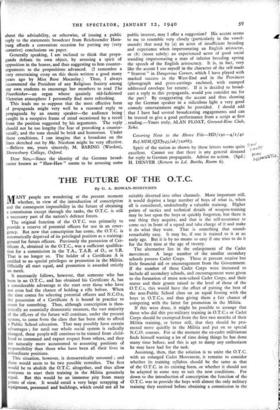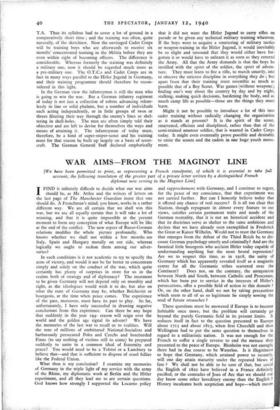THE FUTURE OF THE O.T.C.
By G. A. ROWAN-ROBINSON
MANY people are wondering at the present moment whether, in view of the introduction of conscription and the consequent impossibility in the future of obtaining a commission except through the ranks, the O.T.C. is still a necessary part of the nation's defence forces.
The original function of the O.T.C. was primarily to provide a reserve of potential officers for use in an emer- gency. But now that conscription has come, the O.T.C. is automatically deprived of its privileged position as a training- ground for future officers. Previously the possession of Cer- tificate A, obtained in the O.T.C., was a sufficient qualifica- tion for a commission in the T.A., T.A.R. of 0., or S.R. That is no longer so. The holder of a Certificate A is entitled to no special privileges or promotion in the Militia. Officially all start equal, and promotion is awarded strictly on merit.
It necessarily follows, however, that someone who has been in an O.T.C., and has obtained his Certificate A, has a considerable advantage at the start over those who have not even had the chance of holding a rifle before. When the time comes for selecting potential officers and N.C.O.s, the possession of a Certificate A is bound in practice to count for something. Thus, although conscription is theo- retically an essentially democratic measure, the vast majority of the officers of the future will continue, under the present system, to come from the class that has been able to afford a Public School education. That may possibly have certain advantages ; for until our whole social system is radically changed, these people will continue to be trained from child- hood to command and expect respect from others, and they are naturally more accustomed to assuming positions of responsibility than those who have been all their lives in subordinate positions.
This situation, however, is democratically unsound ; and there would seem to be two possible remedies. The first would be to abolish the O.T.C. altogether, and thus allow everyone to start their training in the Militia genuinely equal. But this would be an immense pity from many points of view. It would entail a very large scrapping of equipment., personnel and buildings, which could not all be suitably diverted into other channels. More important still, it would deprive a large number of boys of what is, when all is considered, undoubtedly a valuable training. Higher points of tactics and technical details of weapon-training may be lost upon the boys or quickly forgotten, but there is one thing they acquire, and that is the self-assurance to come out in front of a squad and take charge of it and make it do what they want. That is something that sounds remarkably easy. It may be, if one is trained to it at an early age. But it is by no means so easy if one tries to do it for the first time at the age of twenty.
The alternative lies in the enlargement of the Cadet movement. A large number of the smaller secondary schools possess Cadet Corps. These at present receive but little financial aid or encouragement from the Government. If the number of these Cadet Corps were increased to include all secondary schools, and encouragement were given to the formation of more non-school Cadet Corps, and their status and their grants raised to the level of those of the O.T.C.s, this would have the effect of putting the best of the non-Public School class on an equal footing with the boys in O.T.C.s, and thus giving them a fair chance of competing with the latter for promotion in the Militia.
If this were done, it might be possible to arrange that those who did this pre-military training in O.T.C.s or Cadet Corps should be exempted from the first two months of their Militia training, or better still, that they should be pro- moted more quickly in the Militia and put on to special N.C.O. courses. For at the moment the ex-cadet militiaman finds himself wasting a lot of time doing things he has done many time before, and this is apt to damp any enthusiasm he may have had for the task.
Assuming, then, that the solution is to unite the O.T.C. with an enlarged Cadet Movement, it remains to consider whether its training syllabus should be the same as that of the O.T.C. in its existing form, or whether it should not be adapted in some way to suit the new conditions. For down to the introduction of conscription the function of the O.T.C. was to provide the boys with almost the only military training they received before obtaining a commission in the T.A. Thus its syllabus had to cover a lot of ground in a comparatively short time ; and the training was often, quite naturally, of the sketchiest. Now the envisaged Cadet Corps will be training boys who are afterwards to receive six months' concentrated training in the Militia before they are even within sight of becoming officers. The difference is considerable. Whereas formerly the training was definitely a military one, now it should be regarded much more as a pre-military one. The O.T.C.s and Cadet Corps are in fact in many ways parallel to the Hitler Jugend in Germany, and their training programme should therefore be recon- sidered in this light.
In the German view the infantryman is still the man who is going to win the war. But a German infantry regiment of today is not just a collection of robots advancing relent- lessly in line or solid phalanx, but a number of individuals each acting independently, or in little groups of twos or threes filtering their way through the enemy's lines or shel- tering in shell-holes. The men are often simply told their objective and are left to devise for themselves the ways and means of attaining it. The infantryman of today must, therefore, be a kind of super-sniper-scout and his training must for that reason be built up largely on a basis of scout- craft. The German General Staff declared emphatically that it did not want the Hitler Jugend to carry rifles on parade or be given any technical military training whatever. If the boys were to acquire a smattering of military tactics or weapon-training in the Hitler Jugend, it would inevitably be so slight and unsound that they would either have for- gotten it or would have to unlearn it as soon as they entered the Army. All that the Army demands is that the boys be instilled with the spirit of the soldier, the spirit of adven- ture. They must learn to fire a rifle, to march smartly, and to observe the strictest discipline in everything they do ; but apart from that their training must resemble as much as possible that of a Boy Scout. War games (without weapons), finding one's way about the country by day and by night, stalking, making quick decisions, hardening the body, and as much camp life as possible—those are the things they must learn.
Might it not be possible to introduce a lot of this into cadet training without radically changing the organisation as it stands at present? It is the spirit of the scout, smartened, efficient and disciplined, rather than, that of the semi-trained amateur soldier, that is wanted in Cadet Corps today. It might even eventually prove possible and desirable to unite the scouts and the cadets in one huge youth move- ment.



































 Previous page
Previous page